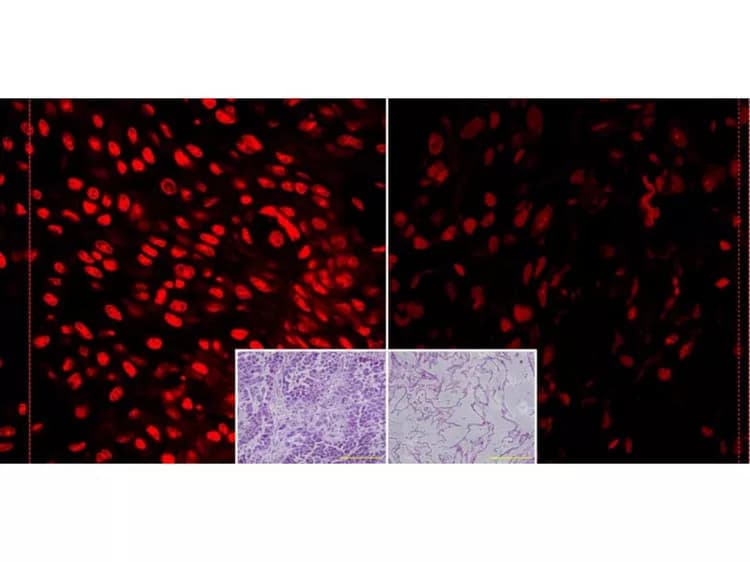
High Doses Of Vitamin C To Improve Cancer Treatment Passes Human Safety Trial
Clinical trials found that it is safe to regularly infuse brain and lung cancer patients with 800 -- 1000 times the daily recommended amount of vitamin C as a potential strategy to improve outcomes of standard cancer treatments. In a work presented March 30, 2017 in Cancer Cell, University of Iowa researchers also show pathways by which altered iron metabolism in cancer cells, and not normal cells, lead to increased sensitivity to cancer cell death caused by high dose vitamin C.
"This paper reveals a metabolic frailty in cancer cells that is based on their own production of oxidizing agents that allows us to utilize existing redox active compounds, like vitamin C, to sensitize cancer cells to radiation and chemotherapy," says co-author Garry Buettner, who was one of the first to propose that cancer cells might have a vulnerability to redox active compounds over 40 years ago. Buettner, along with study senior authors Bryan Allen and Douglas Spitz, are faculty members at the University of Iowa's Department of Radiation Oncology, Free Radical and Radiation Biology Program, in the Holden Comprehensive Cancer Center.
The 11 evaluable patients enrolled in the brain cancer safety trial received three infusions of vitamin C a week for 2 months followed by two infusions per week for 7 months while receiving standard care radiation and chemotherapy. The goal of each infusion was to raise the concentration of vitamin C in a patient's blood to 20,000 μM, as compared to a blood level of about 70 μM found in most adults. The high dose is necessary because vitamin C has a half-life of about two hours in the circulation of humans. The treatment was generally well tolerated; with modest side effects including frequent trips to the bathroom and dry mouth. Rarely, some patients developed high blood pressure that subsided quickly following infusion.
Why is this approach safe? Vitamin C, even at high levels, isn't toxic to normal cells. The research group at Iowa found, however, that tumor tissue's abnormally high levels of redox active iron molecules (a by-product of abnormal mitochondrial metabolism) react with vitamin C to form hydrogen peroxide and free radicals derived from hydrogen peroxide. These free radicals are believed to cause DNA damage selectively in cancer cells (versus normal cells) leading to enhanced cancer cell death as well as sensitization to radiation and chemotherapy in cancer cells.
"This is a significant example of how knowing details of potential mechanisms and the basic science of redox active compounds in cancer versus normal cells can be leveraged clinically in cancer therapy," says co-senior author Douglas Spitz, who focused on the biochemical studies. "Here, we verified convincingly that increased redox active metal ions in cancer cells were responsible for this differential sensitivity of cancer versus normal cells to very high doses of vitamin C."
The safety study sets the stage for phase II clinical trials looking at whether high dose vitamin C is effective at extending overall lifespan and quality of life for patients undergoing radiation and chemotherapy. The researchers are currently enrolling patients with stage 4 lung cancer and will soon begin enrolling people with glioblastoma multiforme (brain cancer) in these phase II trials. They are hopeful that brain cancer responses to radiation and chemotherapy can be enhanced in these phase II trials. This guarded optimism is based on the phase I trial data showing an increase in overall survival of 4-6 months in 11 glioblastoma multiforme patients (18-22 months) versus the 14-16 months survival typically seen with the standard treatment.
"The majority of cancer patients we work with are excited to participate in clinical trials that could benefit future patient outcomes down the line," says co-senior author Bryan Allen, who led the clinical side of the study. "Results look promising but we're not going to know if this approach really improves therapy response until we complete these phase II trials."
The cost per patient above standard insurance billing for the phase II vitamin C glioblastoma multiforme protocol is approximately $8000 spread over 9 months of test infusions. This cost can be less than a single dose of some immunotherapy and/or chemotherapy drugs.
Materials provided by Cell Press. Note: Content may be edited for style and length.
Disclaimer: DoveMed is not responsible for the accuracy of the adapted version of news releases posted to DoveMed by contributing universities and institutions.
Primary Resource:
Joshua D. Schoenfeld, Zita A. Sibenaller, Kranti A. Mapuskar, Brett A. Wagner, Kimberly L. Cramer-Morales, Muhammad Furqan, Sonia Sandhu, Thomas L. Carlisle, Mark C. Smith, Taher Abu Hejleh, Daniel J. Berg, Jun Zhang, John Keech, Kalpaj R. Parekh, Sudershan Bhatia, Varun Monga, Kellie L. Bodeker, Logan Ahmann, Sandy Vollstedt, Heather Brown, Erin P. Shanahan Kauffman, Mary E. Schall, Ray J. Hohl, Gerald H. Clamon, Jeremy D. Greenlee, Matthew A. Howard, Michael K. Shultz, Brian J. Smith, Dennis P. Riley, Frederick E. Domann, Joseph J. Cullen, Garry R. Buettner, John M. Buatti, Douglas R. Spitz, Bryan G. Allen. O 2 ⋅− and H 2 O 2 -Mediated Disruption of Fe Metabolism Causes the Differential Susceptibility of NSCLC and GBM Cancer Cells to Pharmacological Ascorbate. Cancer Cell, 2017; DOI: 10.1016/j.ccell.2017.02.018
Related Articles
Test Your Knowledge
Asked by users
Related Centers
Related Specialties
Related Physicians
Related Procedures
Related Resources
Join DoveHubs
and connect with fellow professionals

0 Comments
Please log in to post a comment.